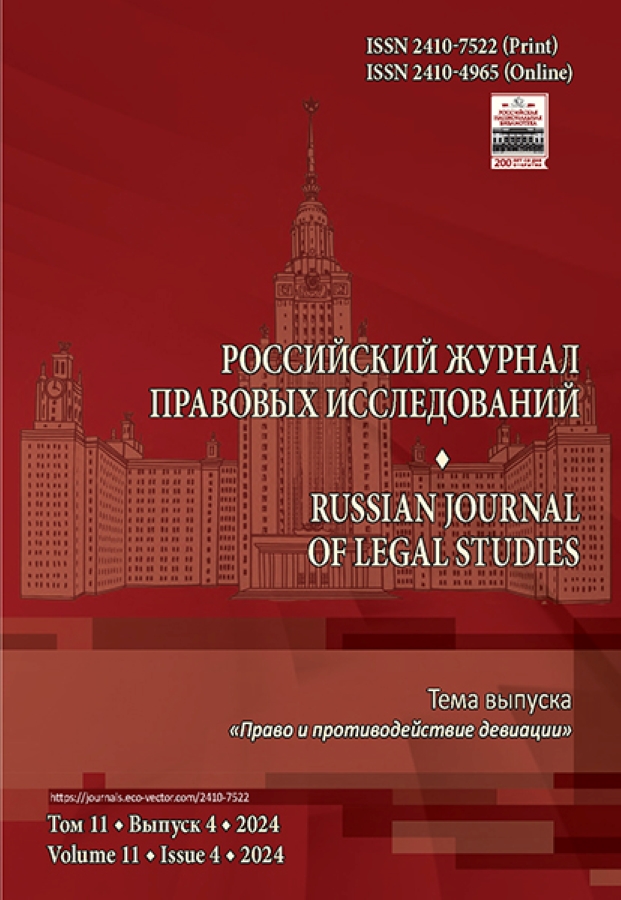The principle of entity equality of the federation as a basis for regulating inter-ethnic relations
- Authors: Gaunova Z.A.1, Pomazanskiy A.E.1
-
Affiliations:
- Institute of Legislation and Comparative Law under the Government of the Russian Federation
- Issue: Vol 11, No 4 (2024)
- Pages: 87-94
- Section: Public law
- Submitted: 29.05.2024
- Accepted: 10.12.2024
- Published: 10.12.2024
- URL: https://journals.eco-vector.com/2410-7522/article/view/632976
- DOI: https://doi.org/10.17816/RJLS632976
- ID: 632976
Cite item
Abstract
The article discusses the purpose and normative potential of the constitutional principle of equality of entities of the federation for the purposes of legal regulation of inter-ethnic relations in the Russian Federation. In combination with other constitutional provisions and principles, it provides constitutional and legal influence on the field of inter-ethnic relations. At the same time, the principle under consideration is a unique example of a legal solution in the field of federal and inter-ethnic relations, since it is applied to a mixed-type federation.
It is emphasized that the equality of entities of the Russian Federation is implemented both through the application of provisions directly formulated in the text of the Constitution of the Russian Federation and based on the interpretative activity of the Constitutional Court of the Russian Federation.
The study proves the dichotomy of the constitutional principle under consideration, which implies the simultaneous existence and interaction of the institutional and substantial components. Each of the components has its own purpose, collectively ensuring the proper balance between normative stability and the dynamics of legal regulation of inter-ethnic relations.
Under conditions of the achieved stability of the architecture of federal relations in the Russian Federation at the current stage, the dynamics of regulation of inter-ethnic relations is ensured through the implementation of powers by the entities of the Russian Federation on subjects of joint jurisdiction. The main focus is on solving such issues as the implementation of state national policy on the territory of the Russian Federation entity, the protection and development of the languages of the peoples of Russia, and maintaining ethno-cultural diversity for the purposes of training, education, and creativity.
The authors identified a tendency towards the normative adoption of the constitutional principle of equality of entities for the purposes of regulating inter-ethnic relations through rule-making by the entities of the Russian Federation using the example of the development of the regional identity foundations.
Full Text
About the authors
Zhanna A. Gaunova
Institute of Legislation and Comparative Law under the Government of the Russian Federation
Author for correspondence.
Email: janna767@yandex.ru
SPIN-code: 7486-2482
researcher
Russian Federation, MoscowAndrey E. Pomazanskiy
Institute of Legislation and Comparative Law under the Government of the Russian Federation
Email: mr_a@mail.ru
SPIN-code: 6717-8988
leading researcher, Cand. Sci. (Jurisprudence)
Russian Federation, MoscowReferences
- Andrichenko LV, Postnikov AE, Vasilyeva LN, et al. Legal regulation of interethnic relations in the Russian Federation: problems of theory and practice: scientific and practical manual. Moscow: Infa-M; 2021. (In Russ.) EDN: DTLBDZ doi: 10.12737/1842506
- Tikhomirov YuA. Law and self-regulation. Journal of Russian Law. 2005;(9):86–96. (In Russ.) EDN: OPCULH
- Postnikov AE. On the constitutional-legal method of regulation. Journal of Russian Law. 2012;(12):32–38. EDN: PHFZJN
- Kutafin OE. The subject of constitutional law. Moscow: Yurist; 2001. 444 p. (In Russ.)
- Postnikov AE. The constitution and the development of constitutional analysis. Journal of Russian Law. 2024;28(3):32–44. EDN: PIKPDJ doi: 10.61205/S160565900028066-6
- Andrichenko LV. Evolution of the principles of federalism in Russia in view of the 2020 constitutional reforms. Journal of Russian Law. 2022;26(3):48–59. EDN: MXVJGN doi: 10.12737/jrl.2022.028
- Kochetkov E. Ideological and theoretical foundations of asymmetric federalism in Russian and world practice. Bulletin of the Russian nation. 2014;(5):134–143. (In Russ.) EDN: SZCKLD
- Khabrieva TYa. Constitution of the Russian Federation: originality, stability and development (on the 30th anniversary of the Russian basic law). Journal of Russian Law. 2023;27(12):5–21. EDN: CJJNPV doi: 10.61205/jrp.2023.135
- Prazauskas AA. India: national policy and federalism. Moscow: Nauka; 1992. 306 p. (In Russ.)
- Lazarev VV, Gadzhiev HI. The main sources (forms) of judicial law. Journal of Russian Law. 2022;26(9):5–22. EDN: PNEGCP doi: 10.12737/jrl.2022.091
- Krylov BS. Problems of equality and equity in Russian constitutional law. Journal of Russian Law. 2002;(11):13–24. (In Russ.)
- Marcoux J. Distribution of powers in the Russian Federation in view of the existing practice of Federal Member States of the Council of Europe. Journal of Russian Law. 2002;(9). (In Russ.)
- Nifanov AN, Novopavlovskaya EE. Interpretation of the principle of equality of subjects of the Russian Federation in the practice of constitutional justice. Bulletin of the Voronezh State University. Series: Law. 2016;(1):39–46. EDN: TSBVSQ
- Vasilyeva LN. Harmonization at sphere of interethnic relations: conceptual ways. State power and local self-government. 2014;(2):18–26. EDN: RWQJWX
- Vasilyeva LN. Language policy in the interests of maintaining the cultural and national identity of Russian citizens. Journal of Russian Law. 2024;28(4):23–36. EDN: OAONWH doi: 10.61205/S160565900029688-0
- Tishkov VA. Requiem for an ethnos: studies in socio-cultural anthropology. Moscow: Nauka; 2003. 544 p. EDN: RAOEBN
- Krylov MP. Toward a theory of regional identity (based on materials from European Russia). In: Semenenko IS, Fadeev LA, editors. Identity as a Subject of Political Analysis. Moscow: IMEMO RAS; 2011. EDN: QOAUDV
- Bakulina SD. Axiosphere of a region: experiences in broadcasting and methods of representing the culture of a place. Omsk: Publishing House of Omsk State Pedagogical University; 2013. 390 p. (In Russ.)
- Zhade ZA. Identity as an interdisciplinary problem of modern science. Bulletin of Adyghe State University. Series: Regional Studies: Philosophy, History, Sociology, Jurisprudence, Political Science, Cultural Studies. 2008;(8):408–411. EDN: KGLNDV
- Galaktionova NA. Peculiarities in modern processes of regionalisation and formation of regional identity. Regionology. 2010;(2):257–264. EDN: MSXJQV
Supplementary files








